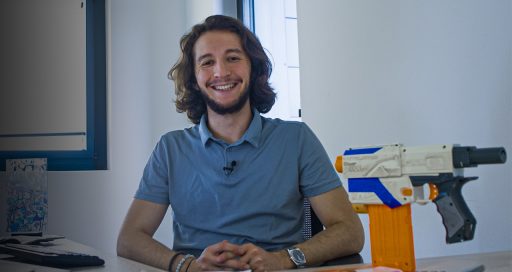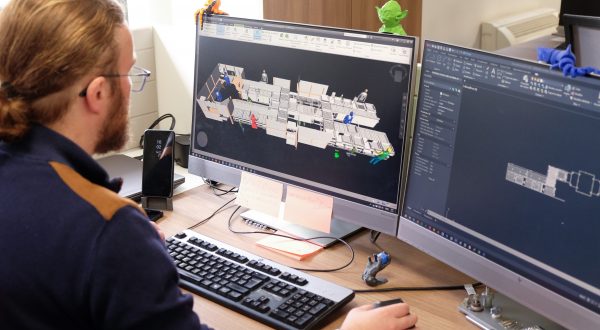CIFRE, a French system through which postgraduate students can complete their doctorate with a company, allows businesses to welcome PhD students for three-year placements. This arrangement brings numerous benefits. Mouloud Iferroudjene, a PhD candidate at LIMOS and his corporate mentor, Thierry Laveille, Head of Product Management, Research and Innovation at Courbon Software, a VINCI Energies business unit, discuss its workings.

What motivated Courbon Software to recruit a PhD student?
Thierry Laveille: We design innovative software packages that can integrate with every industrial production process in various business sectors: pharmaceutical, agrifood, materials chemistry, manufacturing, intralogistics, etc. We wanted a more in-depth look at artificial intelligence. It’s already well represented in our models, but we consider it an important theme for innovation and a competitive lever for our industrial customers and for us, and therefore, a strategic area to be investigated.
Mouloud Iferroudjene, why did you want to be a PhD candidate in a business?
Mouloud Iferroudjene: Working for a PHD in a business, especially an industrial company, is not the most common option. But I am trained in both scientific and engineering disciplines, and really wanted to focus on industry. Working on my thesis in a business enables me to anchor my research in a real environment, giving it an immediate tangible dimension and more immediately identifiable prospects for its application. A kind of usefulness, if you will. I find that interesting and gratifying.
How did you make a selection?
Thierry Laveille: We are based in Saint Etienne, so we naturally approached the EMSE graduate engineering school, and more specifically LIMOS, a research laboratory unit within the school specialising in computing, modelling and systems optimisation. We discussed it at length to identify and define a research topic. AI is a very broad subject. We needed to narrow it to a specific scope to serve the interests of both the laboratory and Courbon Software. From our standpoint, we wanted to be able to explain to our customers what concrete benefits AI could bring them. So, it seemed appropriate to work on the explainability of automatic learning models applied to industrial tasks such as fault detection, predictive maintenance, or the optimisation of production lines. This subject was of great interest to Mouloud, who agreed to work with us for three years.
“To explain to our customers what concrete benefits AI could bring them”
Mouloud Iferroudjene: My work deals with the integration of expert industry knowledge into AI by translating it into rules and formal models (structured data). The title of my thesis in English is Injecting subject area knowledge into automatic learning: integration of formal knowledge into deep learning for Industry 4.0.
What could machine learning bring to Industry 4.0?
Mouloud Iferroudjene: Modern industrial systems generate immense quantities of data, which automatic learning techniques could make better use of. Deep learning excels on raw data such as images. Industrial data is very disparate (numerical, temporal, structured, etc.), which creates a need for complex pre-processing. By incorporating formalised industry knowledge, I hope to make better use of this diverse data and also make the models easier to interpret, which is a major issue in critical industrial systems. I’m trying to develop a generic methodology for integrating this formal knowledge into at least two distinct learning tasks, in the fields of agrifood and pharmaceuticals, combining data and expertise from Courbon Software and the research unit at EMSE.
Is a CIFRE scheme easy to set up?
Thierry Laveille: From an administrative point of view, it’s hard work! We are lucky enough to have an HR department, which made it much easier for us. Besides that, it’s important to find common ground for cooperation with the laboratory. We are clearly engaged in a research partnership approach. The aim of the CIFRE framework is to allow a business to access financial aid for recruiting a young PhD student whose research work, overseen by a public research laboratory, will lead to a successful thesis defence.
What are the benefits?
Thierry Laveille: There is a triple benefit. For the business, it means gaining a valuable human resource and ensuring that time is devoted to R&D. This approach sustains the company’s innovation process. A thesis is a wager on the future. We definitely expect a return on investment from this undertaking. For the lab, the CIFRE scheme opens up professionalisation prospects to its PhD candidates and creates potential for the transfer and development of research. As for the PhD candidates themselves, they get to prepare their thesis within a professional framework, which obviously enhances their employability.
Mouloud Iferroudjene: My ambition is for Courbon Software to obtain substantial benefits from my work over these three years. I’m currently completing the second year of my thesis and haven’t yet decided on my post-doctoral options, but I’m sure I’ll find a good job. Working for three years in a subsidiary of a major group like VINCI Energies has already provided opportunities to meet people and work in productive collaborations, and has confirmed my intention to work in the world of industry. I am convinced that the key to an industrial revolution driven by artificial intelligence lies in the harmonious fusion of raw data and industry knowledge.
06/13/2024
Learn more:
Watch the Video





